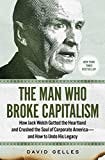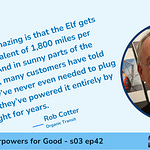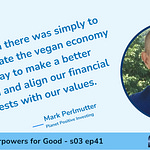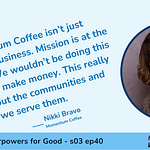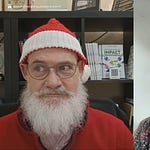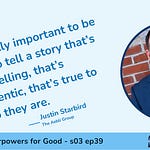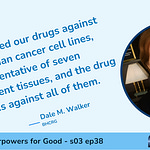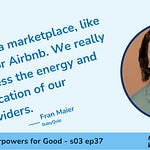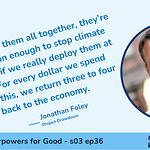When you purchase an item after clicking a link from this post, we may earn a commission.
Devin: What do you see as your superpower?
Ken: One of the things I’ve learned is that I work well with entrepreneurs. I’ve been a five-time entrepreneur myself, but I’ve also enjoyed working with other entrepreneurs.
“We’re the oldest, and we believe also the largest business accelerator in the clean tech climate space,” says Ken Hayes, executive director of Cleantech Open.
Cleantech Open was created to help climate and environmentally-focused entrepreneurs get support, attention and financing they weren’t receiving in the marketplace.
The goal was to help these entrepreneurs build successful businesses. “If a business is not successful commercially, it won’t also be able to succeed in the environmental realm,” Ken says.
Over 1,900 companies have gone through the Cleantech accelerator.
“We work with about 100 companies a year. We match them to business mentors. So we have over 1000 volunteers,” he says. “These are business people that volunteer their time. So, we’re one big community working together to try to help these entrepreneurs become successful.”
From each cohort, the team chooses a grand prize winner. Ken emphasizes the experience that all the participants receive over the four to five-month curriculum. They all benefit.
The winner of the last cohort was Renegade Plascis, which is producing an environmentally friendly alternative to PVC-coated fabrics. “Our low-carbon coated fabrics curtail plastic waste and reduce greenhouse gas emissions,” the website says. “They have a high UV, thermal and chemical resistance and do not contain any PVC, heavy metals, PFAS or phthalates.”
The accelerator works with companies in eight categories:
Energy generation
Energy storage
Energy efficiency
Information and communications technologies
Transportation
Green building
Agriculture, water and waste
Chemicals and advanced materials
Cleantech Open is also concerned with climate and environmental justice. Ken says:
We all have the right to have fresh air, fresh water, clean, clean air. A lot of the companies that are going through Cleantech Open are targeting these communities in order to improve them, make sure that their technologies are not just for wealthy people or wealthy homes but can be used in many different situations and can become affordable and available to people of all backgrounds and all communities.
Over his career, Ken has developed a superpower working to support entrepreneurs.
How to Develop Working With Entrepreneurs As a Superpower
One key to Ken’s success in building this superpower was the decision to develop it. “I’ve wanted to expand the scale of my impact in a positive way,” Ken says.
“What I’m good at is starting small companies, getting them to about 20 people and selling them,” he says. “I wanted to figure out how I could leverage that skill to help others become successful.”
“When you have your own startup, you’re only impacting yourself and your direct colleagues, and all of your eggs are in one basket,” Ken notes.
As an angel investor, he learned he could help more people but limited resources constrained his impact. He co-founded a venture capital fund called Canyon Creek Fund II. That increased the breadth of his impact with funds from limited partners, allowing it to invest in 40 companies.
“Still, I thought there was an opportunity to do more,” he says. “I was approached by the leaders from Cleantech Open to join Cleantech Open. Here it was! Wow! We have 100 to 150 companies a year.”
“I’m a catalyst; I’m a sounding board,” Ken says. “I can provide lessons from the trenches, from past wars, so to speak, and create the system and a platform that can help these entrepreneurs learn and become better.”
“Going through the program for 99% of these companies, they do not give up any equity,” he says. “So we’re not out here trying to make ourselves wealthy. We’re here to help those entrepreneurs become better entrepreneurs.”
Ken says, “We’re here to make the world a better place and make these entrepreneurs successful.”
As an example of the impact of his work supporting entrepreneurs, he highlighted FIGS, a company in which he invested early (and that was coincidentally featured on my show nearly a decade ago.)
Although the successful female entrepreneurs bought him out after 18 months, they went on to list their enterprise on the New York Stock Exchange.
Ken has two critical tips for learning to help entrepreneurs succeed.
The first is “radical candor.” He says, “Be real. Tell them how it really is. Don’t sugarcoat it because you’re not doing them any favors. But do it from a place of sincerity and empathy.”
The second point is to remind the entrepreneurs of an essential fact. “Those who learn fastest are the ones that are going to be successful.”
He prefers the phrase “learn fast” to “fail fast.”
There's another business technique called fail fast. I don't like that word because it connotes failure. Like, who wants to fail fast? Like, I don't want to keep failing. I would I rather use the term learn fast, which means you’re testing. You're trying out new ideas. Maybe you're doing iterative campaigns, but the whole point is to learn as fast as possible about what's going to work, whether it's trying to discover a customer segment, trying to discover how a technology is going to get adopted. It's all about learning that as quickly as possible and ideally based on evidence.
By employing Ken’s example and counsel, you can learn to master the art of helping entrepreneurs succeed, making it a superpower that enables you to do more good in the world.
Recently, I read The Man Who Broke Capitalism by David Gelles. I keep recommending the book to people, so I figured I should take a moment share it with you.






